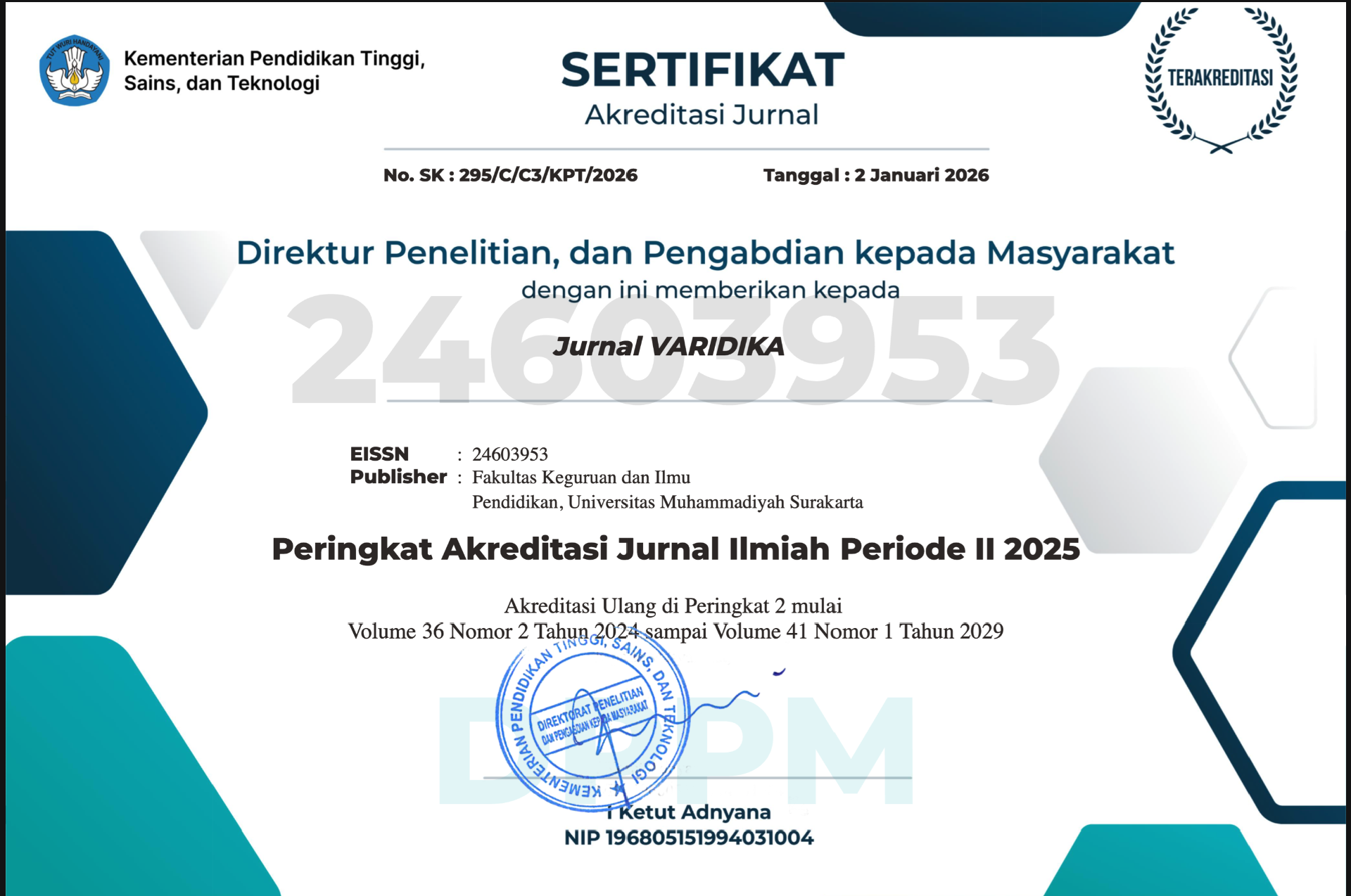Editorial Board Reviewers Peer Review Process Author Guidelines Publication Ethics Focus and Scope Article Processing Charge Contact Journal Metrics Digital Archiving Open Access Policy Sponsorships
Focus and Scope
The VARIDIKA Journal is an international electronic journal that aims to be a center for the dissemination of significant and innovative scholarly studies in the field of education that can be utilized by the research community both at the national and international levels. The journal welcomes research & review articles focusing on the following topics (but not limited):
1. Digital Technology in Education
Digital technology is essential in teaching and learning mathematics to understand the basic concept and the way of problem-solving technique, especially in the 21st century (NCTM, 2008). However, the application of digital technology in classroom activities is a challenge for education practitioners. For this reason, Jurnal Varidika has the intention to publish research related to the application of digital technology in the learning process such as the application of Social Media, Digital Games, Graphing Calculator, Virtual Reality (VR), Dynamic Mathematics Software, Augmented Reality (AR), Internet of Things (IoT), Android/IOS Based Application, or other technology devices and software.
2. Distance Education
Distance learning, also called distance education, e-learning, and online learning, form of education in which the main elements include physical separation of teachers and students during instruction and the use of various technologies to facilitate student-teacher and student-student communication (Simonson, 2021). The case of the Covid-19 Pandemic strengthens discussions related to this issue among researchers and practitioners in the field of education, especially on how to implement distance education effectively and efficiently. Therefore, the Jurnal Varidika focuses on publishing scholar studies that promote the application of distance learning models such as Blended Learning, Flipped Learning, Flip Flop Learning, Learning Management Systems, or any type of distance learning.
3. Character and Cultural Based Education
Character-based education focuses on building the foundational values that will shape the character of our students, rather than merely striving for temporal, performance driven results. It aims to help solve behavioral problems, as well as improve academic achievement by allowing positive values to influence a student's decision making process (Protos, 2014). While Culture-based education is an approach in which teaching and learning happen based on the values, norms, beliefs and practices that are the foundation of any culture (Chettinad, 2020). These two topics are important components of education that can determine the strength of a student's character and identity. So strengthening character and integrating culture in the learning process is important to always be discussed by both researchers and education practitioners. For this reason, the Jurnal Varidika focuses on publishing scholar studies related to character building in education, ethnomathematics, or any studies that strengthen students' character and integrating culture.
4. STEAM-Based Education
STEAM is an educational discipline that aims to spark an interest and lifelong love of the arts and sciences in children from an early age. Science, Technology, Engineering, the Arts and Math are similar fields of study in that they all involve creative processes and none uses just one method for inquiry and investigation (Lathan, 2021). In the 21st Century Education, STEAM Education is very important to be applied at various levels of education so that learning becomes more meaningful. However, the process and method of integrating STEAM in education is still an issue that is still often discussed for many practitioners and researchers in the field of education. Therefore, Jurnal Varidika focuses on publishing scholar studies related to the implementation of STEAM-based Education as an effort to improve the quality of education.
5. Higher Order Thinking Skills (HOTS)-Based Education
Higher Order Thinking Skills (HOTS) is a skill that involves three levels of cognitive abilities (based on the Revised Bloom's Taxonomy), namely the ability to analyze, evaluate and create. In its application to the process of solving a problem, this skill also involves the ability to think critically which functions to parse all existing information and concepts, and use it in solving a complex problem. In the context of learning, HOTS-Based Education is important to be implemented, especially with the aim of improving students' critical thinking skills and the quality of learning that is more meaningful. However, there are still various issues related to the creation of HOTS-based questions and the application of HOTS-based instruction which are still a topic of discussion for researchers and education practitioners. Therefore, the Varidika Journal focuses on publishing scholar studies related to the application of HOTS-based learning in all learning subjects.












